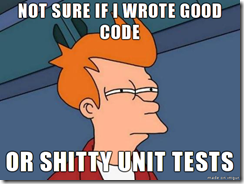Why Unit Test without Mocking your EF Repository
Every once and a while I get a fair amount of flak about how I unit test my services. I’m a firm believer in the Onion Architecture and Repository Patterns and the techniques developed at Online Advisors for implementing those patterns are still better then any other implementation I’ve seen.
 The repository itself is generic and thin. You can see an implementation on this GitHub page. With the underlying data store implementation hidden behind a generic interface that makes it very easy to mock the calls to the database, but should you?
The repository itself is generic and thin. You can see an implementation on this GitHub page. With the underlying data store implementation hidden behind a generic interface that makes it very easy to mock the calls to the database, but should you?
Any Unit Testing purist will tell you that Unit Testing is only testing one small, isolated, functional unit of code. When that unit of code go out of scope it needs to be mocked. This is all well and good, and I do a fair amount of testing like this. But then Entity Framework Code First and automatic migrations came along, coupled with SQLCE or LocalDB why mock your repository?
When my repository method is generic (i.e. a Get, Save, Delete) there is no real logic in there. But when I test it I gain the added benefit of verify that data going to the database and back is correct. Additionally using the Seed method of Entity Framework it’s very easy to scaffold in test data that can be utilized by the test.
Anyone who’s mocked complex data structures knows your basically writing a lot of that by hand, or storing it in a file and deserializing it to be served up to tests. If your going though that trouble, then why not just use EF, Code First, Automatic Migrations and Seeding? It really is a time saving once you got the data in the seed statement.
Additionally it’s helped me find concurrency and data access issues. Because of how unit tests are executed using a lightweight SQL instance I was trace down race conditions and slow LINQ statements. None of which would have been possible by just testing the service or logic layer in isolation.
When I test this way I still call it unit testing. The way it gets the data, either through an In-Memory array, Mock or LocalDB is not what’s being tested. As long as my repository method itself has no code or logic it will be side effect free.
This isn’t without it’s faults and it’s not perfect. Based on their very nature SQLCE and LocalDB are very lightweight version of SQL Server. This means they can’t perform the way normal SQL does, operate in the same way or even use some of the same data types. For example SQLCE doesn’t support the Geo data type.
So it may not be perfect for every scenario or database. But if it’s an option, will be side effect free and won’t cause interdependency issues between tests then really is the difference between that and Mocking? Besides the fact that your exercising more of your code base?
Resgrid is a SaaS product utilizing Microsoft Azure, providing logistics, management and communication tools to first responder organizations like volunteer fire departments, career fire departments, EMS, search and rescue, CERT, public safety, disaster relief organizations, etc. It was founded in late 2012 by myself and Jason Jarrett (staxmanade).